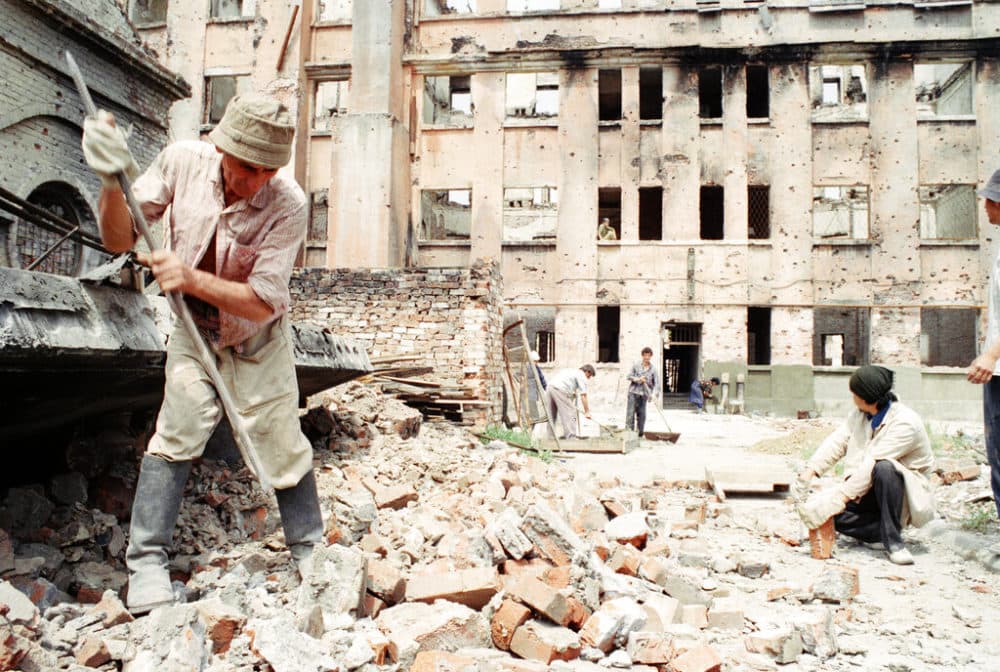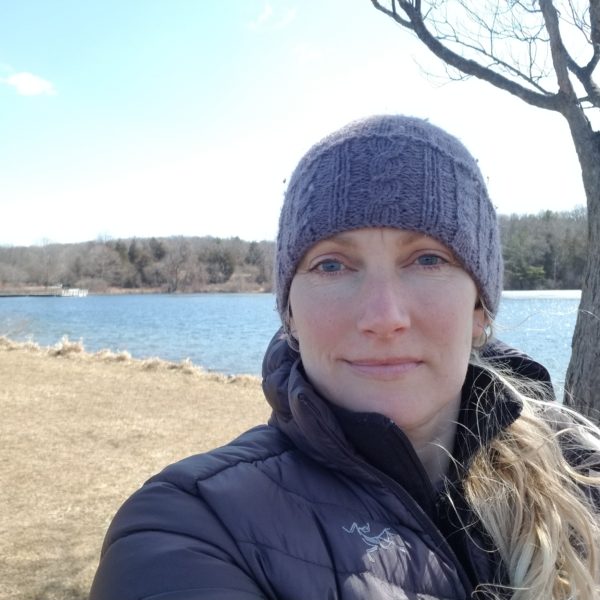Advertisement
What Putin's destruction of Grozny in 1999 means for Ukraine now
Resume
On Tuesday, even Volodymyr Zelenskyy's translator could not hold back his feelings as the Ukrainian President described Russian destruction in Ukraine.
But as Ukraine resists, the Russian military could regroup. Britain's Prime Minister said of Vladimir Putin:
"His only instinct is going to be to double down and to try and 'Grozny-fy' Kyiv, if you know what I mean," Boris Johnson said.
And what does Johnson mean? In 1999, Vladimir Putin ordered the complete destruction of the Chechen capital of Grozny.
The Russian military laid waste to Grozny, killing tens of thousands of civilians. In Putin's own words, his troops "fulfilled their task to the end."
Today, On Point: Lessons from Grozny then, for Ukraine now.
Guests
Andrew Harding, BBC Africa correspondent. He has worked as a foreign correspondent for 30 years. Much of his work has been in conflict zones, and the first war he covered was in Chechnya. (@AndrewWJHarding)
Michael Kofman, director of Russia studies at CNA, a nonprofit research and analysis organization. Author of the Russia Military Analysis blog. (@KofmanMichael)
Paul Stronski, senior fellow in Carnegie’s Russia and Eurasia program. Formerly, he was senior analyst for Russian domestic politics in the U.S. State Department’s Bureau of Intelligence and Research. (@pstronski)
Also Featured
Thomas Dworzak, photographer who covered both Chechen wars.
Transcript: An Interview With BBC Journalist Andrew Harding
MEGHNA CHAKRABARTI: In 1999, Chechen fighters entered Russia's Dagestan region and declared it an independent state. Russia retaliated in Chechnya in what's known as the Second Chechen War. Officially, Russians called it a counterterrorism operation. It was supposed to be brief and victorious.
By October 1999, then Prime Minister Vladimir Putin ordered the complete takeover of the Chechen capital of Grozny. From December 1999 to February 2000, the Russian military laid siege to Grozny. Putin vowed that the military would not stop bombing Grozny until Russian troops quote 'fulfilled their task to the end.' They finished in February 2000, when the BBC's Andrew Harding stepped foot into Grozny, a place the U.N. declared the most destroyed city on Earth.
ANDREW HARDING [Tape]: Russian troops drive into Grozny, the city they destroyed in order to capture. In the suburbs, we saw mile after mile of total devastation, not a single house or cottage intact. Giant craters everywhere. Most streets are still too dangerous to walk down. Thousands of mines and booby traps have been discovered by Russian troops. Not always intentionally. ... This is unreal, it's like walking through a World War II film set, this was the center of Grozny. These were 12, 15 story apartment blocks. Now there is nothing left here.
CHAKRABARTI: The BBC's Andrew Harding, in Grozny, 22 years ago. And he joins us now. Andrew, welcome. What else did you see when you walked into Grozny — or what was left of Grozny that day in February 2000?
HARDING: Hi, Meghna. Gosh, it's chilling to hear that. And obviously in the context of Ukraine to be taken back to those horrific days in Grozny. I remember the people scuttling around, the civilians who'd dared to stay on, who had no option but to stay on trapped in the rubble. I visited families who were in their cellars, who'd been living in their cellars for months under the bombardment. I mean, didn't just destroy city blocks or parts of the city. This was an oil town, a prosperous oil town of half a million people. And it was flattened totally, block by block, ruthlessly, efficiently, deliberately. With every single weapon short of nuclear that the former Soviet army had.
CHAKRABARTI: Flattened. I mean, if I have your career here correct in front of me, Andrew, you've been a correspondent for the BBC for some 30 years, but Chechnya was the first war you had covered.
HARDING: It was the first war, and to be honest, nothing since in the 20-something conflicts I've covered since, nothing's ever come close to that. And I think that's the same for a lot of my colleagues. You know, we still talk about those days just with shock that it could ever have happened, that we were living through, essentially, a Stalingrad of horrific proportions. Of course, there were two wars: Putin's war from '99 to 2000, when journalists were effectively barred from getting in. Very difficult to access. Also, people were out to kill us as journalists. There was a price on my head. Gangsters were trying to to kidnap us. We were, myself, was kidnaped once, briefly. People were trying to execute us, as well. Journalists had their heads cut off. It was terrifying. But the first war, in many ways, was even more scary.
CHAKRABARTI: The first war in the early '90s. The first Chechen War.
HARDING: Exactly, this is what started it all, a much more chaotic start to a much more chaotic conflict. The second war that Putin started was much more ruthless and much more intentional, as you might say. But Yeltsin, Boris Yeltsin, the former president who started the war in 1994, really slid into a war that could easily have been avoided, but the same brutality that we witnessed up close. And I shall never forget walking through the rubble of Grozny early in 1995, during a brief lull, and it still brings shivers to me just thinking about going and finding people in their basements, whole families living there too scared to leave.
... I remember saying, we've got to go. The fighting, the shootings [are] going to start again soon and these families just too terrified to leave. And I remember on our way out being cluster bombed by the Russian Air Force, these huge explosions overhead. Then these tiny small bomblets coming down onto the ground, shooting out arrows in all directions, mowing down everybody. These are the sort of weapons they were using. And we dive for cover behind anything concrete, and those who weren't quick enough were torn to shreds. It was absolutely horrific.
CHAKRABARTI: So the first Chechen War, the Chechens had essentially declared independence. Russia retaliated. It was, as you said, it was a horrific war in the early and mid '90s that ended in a stalemate, essentially. Vladimir Putin witnessed that, he wasn't yet prime minister. But is it fair to say that the stalemate ending in the devastation of the first Chechen war set up Putin's desire to finish the job, for the lack of a better phrase, in 1999, when he became prime minister of Russia?
HARDING: Exactly. The Chechen rebels who number just a few thousand, 4,000, 5,000, very battle hardened, very determined, fearless fighters operating on foot, largely, in small groups. They brought to its knees a super power army that had vast conscript legions at its disposal. A huge armory. Helicopter gunships. MiG fighter planes. But this small, determined group brought that military to a stop. Basically said, You can capture towns, you can destroy the country, but you can't defeat us.
And the Russians eventually admitted that, signed a kind of peace deal, allowed the Chechens to have elections. In which the Chechen military commander, a man called Aslan Maskhadov, actually won the election. And for a time it seemed as if some sort of sanity, some kind of deal could prevail. But unfortunately, Chechnya slipped back into chaos. And then in 1999, you had a series of extraordinary attacks blamed on the Chechens, some of them clearly the responsibility of the Chechens, attacking neighboring countries.
But you also had apartment bombings far from Chechnya. And I remember walking through the rubble of apartments that have been blown up suddenly in Moscow in, I think, September 1999. And what's so chilling about those apartment bombings was that they became the pretext for the second war, for Vladimir Putin's war on Chechnya, as you say, to get the job done there, to crush the Chechens. But there is strong circumstantial evidence that it was Vladimir Putin and his own security services that were actually responsible for those bombs blowing up their own people to create the pretext for another war.
CHAKRABARTI: What was called a counterterrorism operation right at the time in 1999. It seems critical to understand that, you know, in the first Chechen War, in the mid 90s, this was Russia as immediately as post-Soviet Russia. So the military had been the Great Red Army before that. And then, as you note, in the first Chechen War, it's essentially humiliated by this ragtag bunch of rebels that managed to stop the Russian Army, or at least force them into a stalemate.
How important is it to understand that perhaps unwillingness to be humiliated again that Putin had in 1999 when he ordered? I mean, the complete destruction, as you describe, of Grozny in 1999 that led to the deaths of so many. How important is it to understand that? I mean you yourself on Twitter, Andrew, recently said that what you're seeing in Ukraine has strong echoes of what you saw in Chechnya.
HARDING: Huge echoes, I mean, I remember actually being asked by the Chechens to take out Russian P.O.W.s that the Chechens had captured, but they couldn't deal with, there were just so many young conscripts absolutely scared out of their wits, surrendering everywhere. And we've seen suggestions, at least to that in Ukraine, already. These young conscripts sent into battle with barely any equipment, no real idea where they were going, what they were doing, cannon fodder. And that was part of this sense of Russia's humiliation. Of course, it was in the context of economic collapse since 1991, of gangsterism taking over the economy.
Of a country that had lost its way and saw the import of American culture, American goods that felt it was being humiliated. And different parts of the Russian state took different lessons from that. Some people said, The answer is democracy. We need to accelerate democratic reforms. We need to embrace Europe. We need to move in that direction. But the colder, harder people like Vladimir Putin focused on the humiliation, felt that it was deliberate. And looked at NATO's gradual expansion, and saw this as the West seeking to humiliate Russia. Rather than Russia and the Soviet Union being the architects of their own collapse. And that really, I think, has fueled people like Putin so strongly.
HARDING: The totality of civilian deaths between the two Chechen wars. I'm seeing numbers anywhere from 30,000 to perhaps more than 100,000. ... Can we fairly say that that gives us any indication of how far Vladimir Putin may be willing to go in Ukraine?
HARDING: I don't know. But I fear so. Chechnya was a very different war. The Chechens have been demonized for years. There's a sort of racism against the darker skinned people of the Caucasus that was exploited and whipped up. And this was part of Russia's own territory. Ukraine, much more complicated. But Putin has created his own narrative around that, that we've heard so much about, about reclaiming original Russian territory.
Kiev, you know, deeply precious to Russia's sense of itself and its history. Hard to imagine the Russian military razing all that architecture, all that history, all those churches to the ground. And yet if this war continues in the way it's continuing, what happens inevitably is that the generals who have been ordered to seize a capital, if their troops aren't willing to fight or aren't able to fight on the ground successfully, what do you do? You turn to the weapons that will work, that will deliver you the city. Even if what you hand to Putin is a victory that is pure rubble. So, you know, there is in Chechnya, a horrific precedent for that.
This program aired on March 2, 2022.

